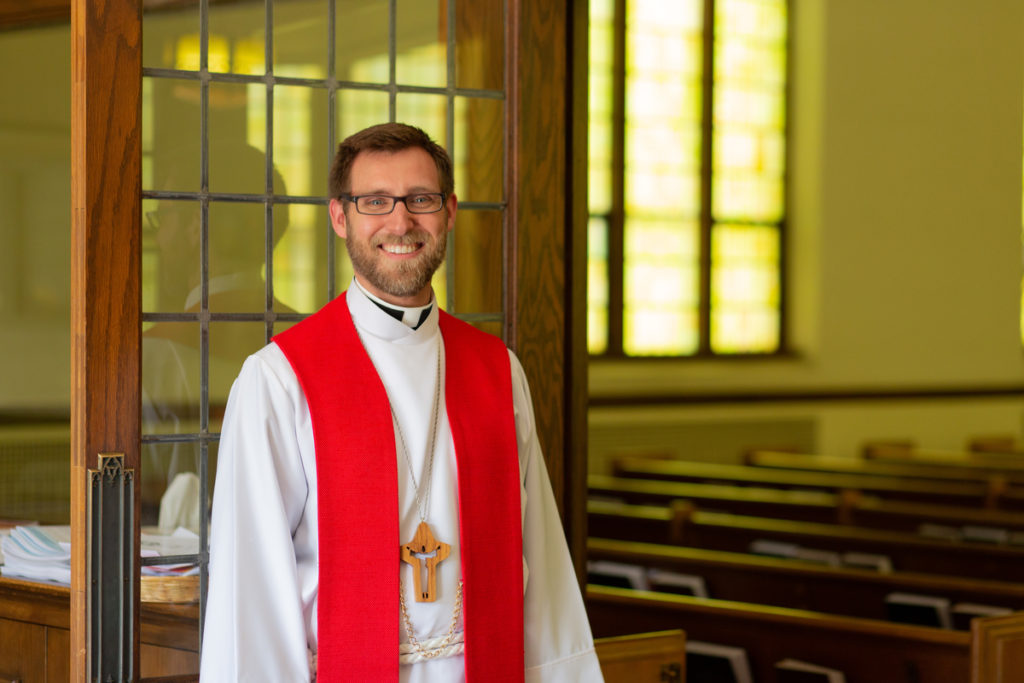“WHY ARE YOU FRIGHTENED?”
Are you a worrier? Do you know someone who is a worrier? Are you married to someone who is a worrier? I know that for me most of the things I worry about never happen, and the bad things that do happen, usually are things that I never thought of to worry about. But still, I keep worrying. Whenever my wife says to me, “Now don’t panic but,” I always start to panic.
In the Gospel reading for the third Sunday of Easter from Luke 24 Jesus asked His disciples, after He appeared to them on Easter Sunday evening, “Why are you frightened, and why do doubts arise in your hearts?” (verse 38) Those are good questions for us as well.
Many people are worried about and are afraid of the future. For many the pandemic has made their fears only worse. The disciples also were afraid of the future. Things were looking pretty bleak, and they were having to face some pretty tough enemies. It would have been very easy for them to wonder, What will the future hold? Will we even have a future? So Jesus said, “Look at my hands and my feet; see that it is I myself. Touch me and see.” (verse 39) Jesus wanted His disciples to know that He was alive. It was all real. Death has been defeated. God has won. The Gospel is true.
Second, many people are worried about and are afraid because of the past. Once again, Jesus speaks to our greatest needs. He said to His disciples, “Repentance and forgiveness of sins is to be proclaimed in (My) name to all nations.” (verse 47) As followers of Jesus we have a way for dealing with sin and guilt that will work in a way in which nothing else will work. And it is God’s way. Repentance and forgiveness of sins. Are you worried about and afraid because of the past? Believe in the Gospel. Jesus has the answer. Jesus is the answer. His blood can blot out and cover over your past.
Third, many people are worried and afraid because they feel powerless to deal with the present. They feel overwhelmed with the here and now. What did Jesus say to His disciples? He told them, “Stay here in the city until you have been clothed with power from on high.” (verse 49) That’s what we need – power from on high. And that’s what the disciples received on the day of Pentecost. Human power is so limited when we compare it with the circumstances in which we find ourselves. But even the worst of situations has no real power when compared with God’s power. And God’s power is available to you.
So, to get back to Jesus’ question, “Why are you frightened, and why do doubts arise in your hearts?” Is it because of the future? God has the future under His control. Is it because of your past? Your sins can be thrown into the deepest sea and because of Jesus need never be retrieved again. Is it because of the present? There is power available to all who call upon His name.
* * * * * * *
PROPOSED REVISION OF “DEFINITIONS AND GUIDELINES FOR DISCIPLINE” –
A CHANCE FOR HONESTY
OR ONE MORE EXAMPLE OF DUPLICITY?
After more than a year of consulting and writing, the ELCA Committee on Appeals has completed a draft for the revision of “Definitions and Guidelines for Discipline.” As required by the ELCA constitution, this document was reviewed by the Conference of Bishops in early March, and now will be considered for possible approval by the ELCA Church Council when it meets in mid-April. The document may be found (here). The report from the Committee on Appeals concerning its work may be found (here). This document describes the grounds for which discipline may be imposed.
One of the first things to note about this document is how little of it actually has to do with human sexuality. In section B., which is entitled “Conduct incompatible with the character of the ministerial office” (under the larger section “Guidelines for Discipline of Rostered Ministers”), only one out of fifteen sub-sections (B.5.) deals with “Sexuality and public ministry.”
The Committee on Appeals has published a summary of the responses which they received to various surveys as they conducted their work. A link to that summary can be found (here). People who participated in the surveys should be happy to note that the document does address such issues as confidentiality, relationship to family, addiction and substance abuse, fiscal responsibility, harassment of persons, inappropriate behavior on social media, plagiarism, copyright infringement, and even an inappropriate relationship with a prior congregation. The list of organizations that a rostered person could be disciplined for joining has been expanded to include those that are white supremacist, racist, sexist, and homophobic. There are also sections on Guidelines for Discipline of Congregations and Members of Congregations. Those who responded to the surveys should be happy to see that harassing or attacking a rostered minister is also included within the reasons for discipline.
The next thing to note is how basically conservative the section on “Sexuality and public ministry” (B.5.) actually is. This relative conservatism stands in sharp contrast with the actual current practices, emphases, and priorities of the ELCA. Footnote 9 refers the reader to “A Social Statement on Human Sexuality: Gift and Trust” and the social message, “Sexuality: Some Common Convictions.” “Sexuality: Some Common Convictions” is a social message adopted by the ELCA Church Council in 1996. “Human Sexuality: Gift and Trust” is a social statement approved by the 2009 Churchwide Assembly. After acknowledging a lack of consensus within the ELCA on how to regard committed same-sex relationships, and after describing four different views, including two more traditional views, held by people within the ELCA, the 2009 social statement says that the ELCA, “on the basis of ‘the bound conscience,’ will include these different understandings and practices within its life.” (page 19) The ELCA website says that the social statement, “Human Sexuality: Gift and Trust,” “now serves as the primary and comprehensive teaching and policy document of the ELCA.”
Page two of “Definitions and Guidelines” is entitled “Grounding Context.” The final sentence on that page states, “No language in this document may be construed to contradict or override a current authorized social teaching of this church.” That sentence in and of itself is pretty amazing. We have written much about how often the ELCA rejects any obligation to honor the commitments expressed in or to respect the boundaries defined by the 2009 human sexuality social statement. But here in footnote 10 it says, “In 2009, this church expressly addressed the question of sexuality and public ministry in ‘A Social Statement on Human Sexuality: Gift and Trust.’” Later in this same footnote it states, “Provision B.5. is substantially based on this teaching of this church. This provision does not change the aspirational teaching of this church, set forth in its social statements, that all members of this church should abstain from sexual intercourse before married.”
But before we become too optimistic, we should realize several things.
First, according to the report from the Committee on Appeals referenced above, the Conference of Bishops held two separate votes on the document. The Conference first voted 57-8 to support the draft document except for section B.5. Then the Conference voted 33-32 to support section B.5. It would not take much to have a different outcome to the vote. In fact, just the election of one new bishop in one synod would do it. And we all remember that the issue of blessing and ordaining persons in same sex relationships was pushed and pushed and voted on over and over again until those who wanted a change in ELCA policy and practice got what they wanted.
Second, the use of the phrase “aspirational teaching of this church” in footnote 10 under B.5. is interesting. “This provision does not change the aspirational teaching of this church, set forth in its social statements, that all members of this church should abstain from sexual intercourse until married.” What in the world is the status of an “aspirational teaching of this church”? It is not required, mandated, or even expected. It is just an “aspirational teaching of this church.” Talk about a weak and limp statement. Is this intentional so that the most famous ELCA pastor can continue to brag about her sex outside of marriage?
Third, it is interesting that the section on “Definitions” does not define “promiscuity.” It defines all the other behaviors listed in the second paragraph of B. 5., which are examples of “conduct incompatible with the character of the ministerial office.” It defines infidelity, adultery, and sexual abuse, but it does not define promiscuity. As in the previous paragraph, one wonders if there is a reason.
Fourth, my greatest concern is that the relative conservatism of this document will be just ignored in the actual practice of “this church.” As stated above, the final sentence on the page entitled “Grounding Context” reads, “No language in this document may be construed to contradict or override a current authorized social teaching of this church.” And there are three places where footnotes 9 and 10 for section B.5. refer to the 2009 social statement, “Human Sexuality: Gift and Trust.” But do we have any reason to believe that the ELCA will now actually take any more seriously what that social statement actually says?
We have written often and much on this subject. Examples of the ELCA’s ignoring if not actually violating the commitments and boundaries of that social statement include the ELCA’s claim to be celebrating the tenth anniversary of LGBTQIA+ persons’ being able to serve freely in the church, a transgender activist as keynote speaker at the 2018 ELCA youth gathering, another keynote speaker at that same gathering who led 31,000 young people in renouncing traditional views as a lie, providing a link on the ELCA website to resources from ReconcilingWorks but not also to resources advocating for traditional views, the choice of workshop leaders for the 2021 ELCA youth workers extravaganza, and the refusal of “Living Lutheran” to publish or post an article offering an alternative (traditional) view of the Netflix Queer Eye episode that featured a gay ELCA pastor and a gay ELCA bishop.
The ink on the Conference of Bishops’ acting to approve and recommend this revised version of “Definitions and Guidelines” barely had time to dry before two ELCA synods acted to ignore and even violate the covenants, commitments, and boundaries of the 2009 human sexuality social statement. I assume there have been more. These are the ones I am aware of.
The Rocky Mountain Synod in their email newsletter dated March 31 promoted March 31 as the “Trans Day of Visibility.” A March 26 email from the Southwest California Synod announced Elle Dowd as the presenter for their April 14 spring multi-conference assembly. Elle Dowd is a graduate of an ELCA seminary and an ELCA candidate for ordained ministry. On her website she describes herself as a “bi-furious pastor-in-training who preaches, writes, and teaches about God’s desire to liberate us from the things we use to oppress each other.” Those oppressors include cis-heterosexism and queerphobia. The next sentence reads, “She believes . . . that a queer/femme interpretation of scripture is at the center of grace.”
How could two bishops – even if they were among the thirty-two who voted against approving section B.5. of “Definitions and Guidelines” – so blatantly violate what had so recently been approved by the Conference of Bishops?
But if you think that is bad, it gets worse. The email from the Rocky Mountain Synod was sent out on March 31 – the Wednesday of Holy Week. Even though it was Holy Week, top billing in the email went to the Trans Day of Visibility. The second item was a letter from ELCA Presiding Bishop Elizabeth Eaton about gun violence. Holy Week came in a sad and disappointing third – with the Easter letter from Bishop Eaton.
Even worse is the choice of presenters for the Southwest California Synod’s spring multi-conference assembly. The promotional material for Elle Dowd’s book, Baptized in Tear Gas, describes her as “an Assata Shakur-reading, courthouse-occupying abolitionist with an arrest record, hungry for the revolution.” Assata Shakur is a former member of the Black Liberation Army (BLA), who was convicted in the first-degree murder of a state trooper during a shootout on the New Jersey turnpike in 1973. Assata is wanted by the FBI, there is a two-million-dollar reward for her apprehension, and she has fled to Cuba. I have written to the interim bishop (this synod was my synod before I retired), saying, “It is outrageous that the Southwest California Synod would lift up and choose as a presenter someone who would be promoting those kinds of values.” As I expected, I have not received a reply.
Fifth, section B. 2. under “Conduct incompatible with the character of the ministerial office” reads, “Rostered ministers must be honest and forthright in their dealings with others. Dishonesty, deception, duplicity, or the manipulation of others for personal benefit or gain is conduct incompatible with the character of the ministerial office.”
With very few exceptions ELCA leaders consistently fail to respond to the communications I have sent about their not abiding by the commitments in the 2009 human sexuality social statement to honor also those with traditional views. In addition, the ELCA does not remain within the boundaries of what was actually considered and approved in that social statement. I cannot see that behavior as anything other than the ELCA’s not being honest and forthright in its dealings with people with traditional views. The social statement and ministry policies that were approved by the 2009 churchwide assembly are far more traditional and conservative than what the ELCA is fully embracing today. How are we to view the 2009 social statement and ministry policies as anything other than dishonesty, deception, duplicity, and the manipulation of those with traditional views for the eventual benefit and gain of those with highly revisionist views? Did anyone really think that what was presented for action and approval in 2009 was “as far as it was going to go” rather than “presenting what we can get a Yes vote on at this time so that we can go further next time”? If the ELCA expects its rostered ministers to be honest and forthright in their dealings with others, does not the ELCA also need to be honest and forthright in its dealings with those with traditional views?
Sixth, the fifteen and final paragraph under “Conduct incompatible with the character of the ministerial office” (B.15.) is entitled “Adherence to covenantal relationships.” It reads, “Rostered ministers who actively and affirmatively incite, initiate, or encourage a congregation to leave the ELCA are engaged in conduct incompatible with the character of the ministerial office.” That sentence references footnote 18, which reads, “Consistent with the faith and practice of the Evangelical Lutheran Church in America . . . Each pastor with a congregational call shall, within the congregation . . . encourage adherence to covenantal relationships with this church as expressed in the Constitution, Bylaws, and Continuing Resolutions of the Evangelical Lutheran Church in America.”
We have already discussed how the ELCA does not abide by and adhere to its covenantal relationships. How could it imagine itself to have the integrity and moral authority to discipline rostered ministers whom it says are not abiding by and adhering to their covenantal relationships? Also, since the process by which a congregation can vote to disaffiliate from the ELCA has been defined in the Model Constitution for Congregations of the ELCA (Section C6.05), how can the ELCA say that a rostered minister is not encouraging “adherence to covenantal relationships with this church” if that rostered minister is urging and leading a congregation in following the provisions provided and outlined in the Model Constitution for Congregations of “this church”?
Writing all of this, I find solace and protection in the fifth definition on the “Definitions” page of the “Definitions and Guidelines” document. There it says, “’Harass’ means to persistently annoy another or to create an unpleasant or hostile situation by uninvited and unwelcome verbal or physical conduct. Mere criticism or disagreement is not harassment.” As always, what I have written is criticism and disagreement, not harassment.
Dennis D. Nelson
Executive Director of Lutheran CORE
Click here to join our email list!



















